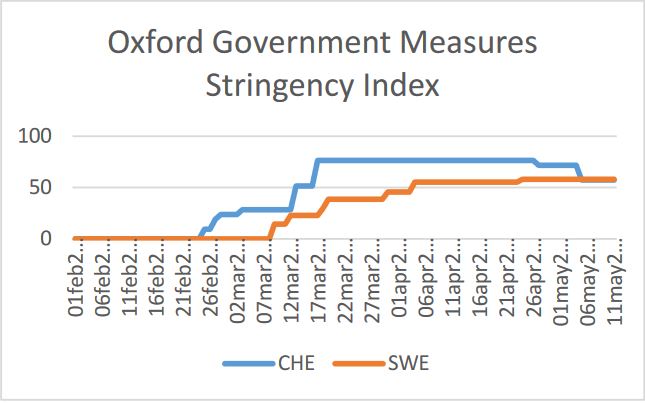13 May 2020 – Policy Brief
There is a lot of interest in the approach to COVID-19 taken by Sweden. Here we compare the measures taken to control the epidemic in the two countries post May 11, as well as relevant epidemiologic and economic indicators.
Executive summary
The emphasis in Sweden was on voluntary measures, with a focus on (hand) hygiene, spatial distancing and staying at home in case of symptoms (“everyone is responsible for preventing infection”). The compulsory schools (1st to 9th grade), restaurants, bars and nightclubs and businesses stayed open throughout. Gatherings up to 50 people are allowed. Higher education has switched to online teaching.
The response of Sweden and Switzerland are similarly stringent as of mid-May according to the Oxford Government Stringency Index (see Figure below). The economic indicators show an increase in unemployment in both countries, and a similar projected decline in GDP for 2020. Testing was more widespread in Switzerland than in Sweden.
Re is estimated to be around 1 in Sweden, and below 1 in Switzerland. The daily number of cases fluctuates around 500 in Sweden but has been declining steadily in Switzerland to below 50 cases. Sweden has recently overtaken Switzerland in the number of reported cases. The number of deaths in Sweden is about double the number in Switzerland, and about 3-times higher in age groups below 60 years. Mortality per million population is about 75% higher in Sweden than in Switzerland. The Swedish situation corresponds to a scenario of a constant, relatively high number of cases and deaths, similar to scenario 2 described in a recent policy brief (“Epidemiologische Szenarien nach Lockerung der Massnahmen per 11. Mai 2020”).

https://www.bsg.ox.ac.uk/research/research-projects/coronavirus-government-response-tracker
Date of request: 10/5/2020
Date of response: 13/5/2020
In response to request from: –
Comment on planned updates: This is the first update
Expert groups and individuals involved: International, Econ
Contact persons: Matthias Egger, Roman Stocker, Monika Bütler